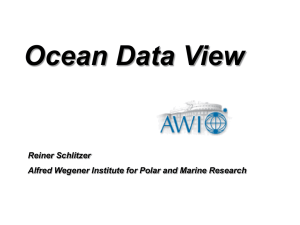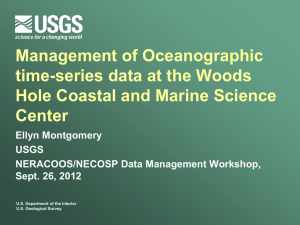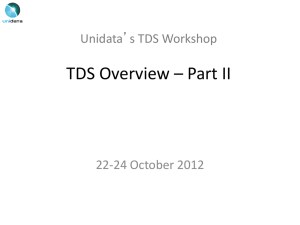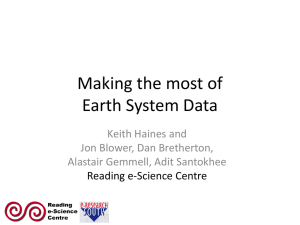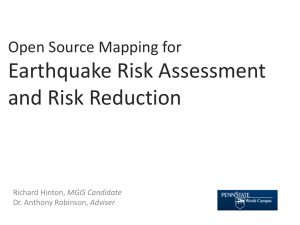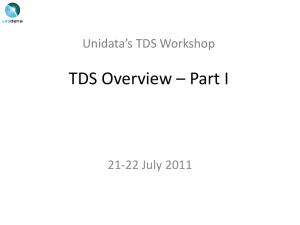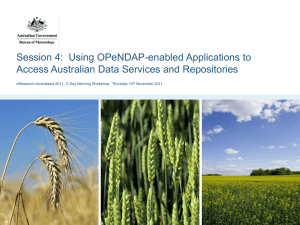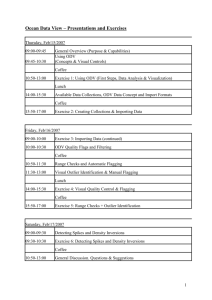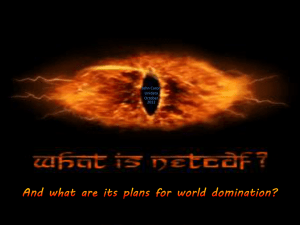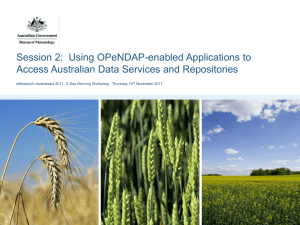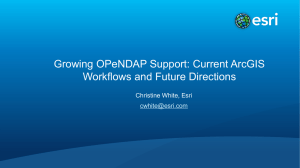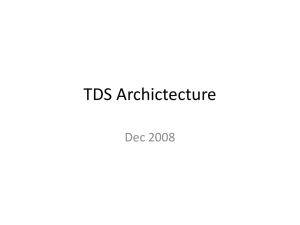document
advertisement
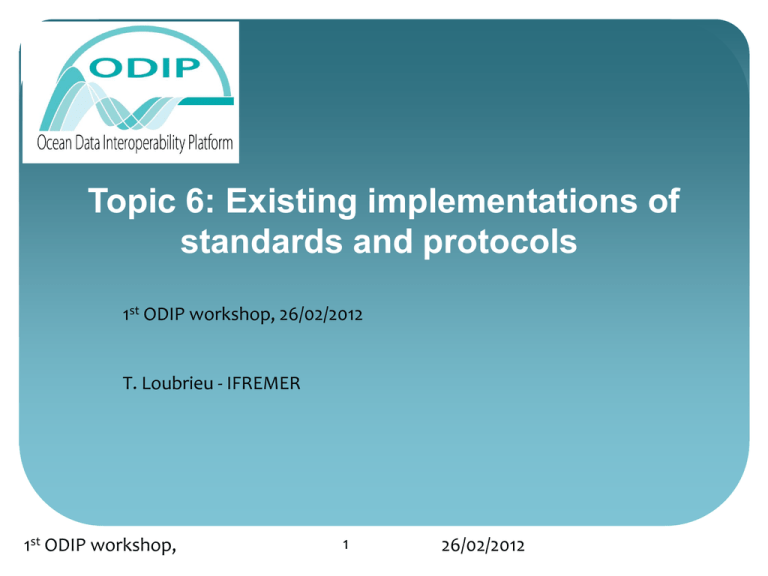
Topic 6: Existing implementations of standards and protocols 1st ODIP workshop, 26/02/2012 T. Loubrieu - IFREMER 1st ODIP workshop, 1 26/02/2012 Overview 3 categories of tools Servers: for technical back-end or end users, generic or community specific (water column, sea bed, …) Desktop application for analysis and visualization (clients) Tools for data management (upstream data centres) Shared when possible, but can be as many as needed Some key shared components API or shared code: netcdf, opendap, ncWMS, seismicunix Reference infrastructures: vocabulary services and reference directories, user directory and authentication systems, DOI provider, scientific papers registry And of course the standards and protocols themselves. THREDDS Data Server Targeted community: Ocean physics and bio-geo-chemistry observation/analysis/forecast projects water column Features: Netcdf file format Gridded dataset aggregation (time axis, phenomenons) Provided services: OPeNDAP OGC/WMS 4D THREDDS metadata THREDDS Data Server THREDDS Data Server THREDDS Data Server Clients: Godiva browser, Sextant browser (WMS) Geonetworks (for harvesting metadata) Perspectives: User authentication and accounting (available but breaks client) ncWMS update Operational support or formal agreement on this. Deployment: 16 data centres (myOcean) Oceanotron Targeted community: Ocean physics and observation projects bio-geo-chemistry water column Features: Netcdf/OceanSites file format In-situ profiles, pointSeries and trajectories Aggregation based on plug-ins implementing CSML feature types. Services Provided (as plug-in): OPeNDAP OGC/WMS 4D Oceanotron Oceanotron Clients: Godiva browser Jsdap (javascript) and pydap (python) API Perspectives: Aggregates ODV files collection WFS and SOS implementation (shared schema) Checksum computation for observations identification Deployment: 7 data centres (myOcean) duplicate High Resolution Seismic Viewer System Targeted community: Sea-bed observations (geo-seismic) community Features: Reads SEGY, UKOAA file format Seismic profiles visualization and analysis Provided services: Ad-hoc applet application as back-end High Resolution Seismic Viewer System High Resolution Seismic Viewer System High Resolution Seismic Viewer Clients: End users (applet) Perspectives: Turn it to operational system (instead of demo) Enable to give on-line access to off-line datasets (on tape) Deployment: 5 data centres (geo-seas) Generic servers Download Manager For seadatanet, geo-seas Used for the user to retrieve and download data files related to observations (stored in CDI) For water column observation, enables data files to be converted (ODV) and/or split. More than 80 instances deployed On-the-shelf constellation GIS servers: mapserver, geoserver, VSFTP: For myOCean Used to get access to raw files with user transaction accounting (authentication done through central LDAP) Constellation SWE Geonetwork Targeted community: Every community Features: Metadata edition (e.g. ISO19139) Harvesting (e.g. THREDDS metadata) Applies templates and profile validation (e.g. INSPIRE) Uses controlled vocabularies Glue for distributed systems as it gathers the configuration (datasets and dissemination services) of the whole components Provided services: CS-W service Geonetwork Geonetwork Geonetwork Geonetwork Clients: Dedicated web portal, Sextant system at IFREMER To fulfil INSPIRE requirements Perspectives: New metadata templates (SeaDataNet, EMODNET) dataCite export RDF export to browse dependancy graphs (similar to linked data ?) Set up facetted search client on top (SOLR) Desktop analysis and visualization tools ODV: For water column observations (seadatanet) Data analysis and visualization, quality assessment DIVA For water column observations (seadatanet) Spatial analysis of observations Results disseminated with a 4D WMS implementation (OceanBrowser) Globe (includes 3D DTM viewer): For bathymetry observations (geo-seas) Data analysis and visualization, quality assessment dedicated Globe’s 3D DTM viewer Desktop Upstream observation management Mikado: For every community (seadatanet, geo-seas) Manually or automatically generates metadata records (iso19139, sensorML and O&M) NEMO For water column observations (seadatanet) Generates standard data files (ODV, netCDF) from any CSV (e.g. XBT files). EARS For every community (Eurofleet) Electronic log book of operations and events at sea. EARS (MUMM, OGS, IFREMER) Automatic Event Entry (selected sensor acquisition) Manual Event Entry Based on common and dedicated vocabularies Creates ontology Multilingual Time-stamps and geo-references Reporting Ship summary reports: daily reports send on-shore Cruise Summary reports: sent at the end of the cruise (iso19139) An ecosystem ! Synthesis ? The Glue of our systems Geonetwork Advanced services servers THREDDS Data Server Oceanotron … Shared API: netcdf/cdm, opendap, ncwms, seismicunix Reference infrastructures (mostly seadatanet) Vocabulary services (BODC) Reference directories (e.g. organizations:EDMO) Reference catalogues (Cruises:CSR, Observations:CDI) Background applications (EARS, ODV, MIKADO, NEMO)
